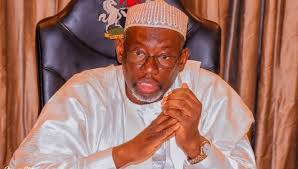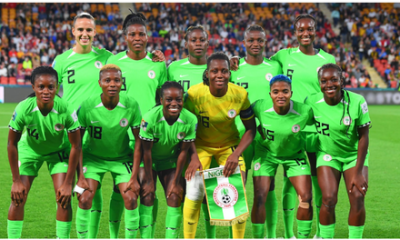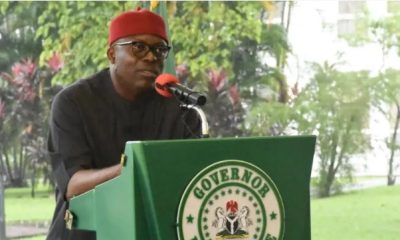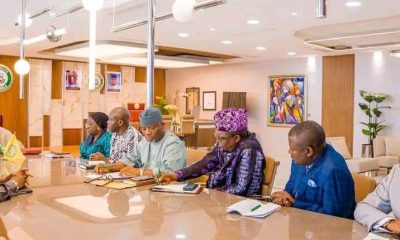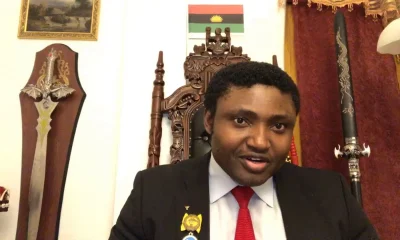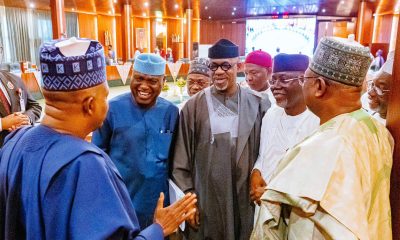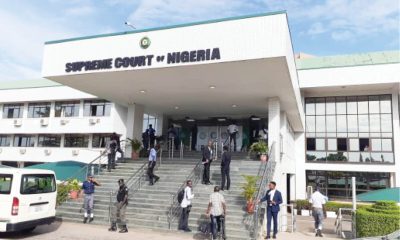Gov. Umar Namadi of Jigawa on Monday said that the proposed nationwide protest slated for August 1, is not the solution to Nigeria’s current challenges.
The governor voiced out his opinion at a town hall meeting with 27 groups in Dutse.
The News Agency of Nigeria (NAN) reports that the Nigeria Labour Congress (NLC), the Christian Association of Nigeria(CAN) and the National Association of Nigerian Students (NANS), among the groups that participated in the meeting, disassociated themselves from the planned protest.
Namadi, who acknowledged the economic hardship in the country, regretted that it had brought so many uncertainties.
“But, protest is not the solution.
“There are many ways people could express their grievances; people are at liberty to display their grievances through protest under democratic dispensation, but that isn’t the most effective way to address the problems.
“The protest alone will not provide the solutions; people should turn to God, repent, seek for forgiveness and divine intervention on the challenges.”
Namadi said that the government had been doing enough in terms of providing food items and other materials, including distribution of cash, to cushion the effect of the hardships at all levels of government.
The governor also reminded the people that the Federal Government had recently approved the importation of food items into the country for five months without import duty.
Namadi advised Nigerians to accept the hardships as a trial from God, adding that every Muslim believes in destiny whether good or bad.
The Police Commissioner in Jigawa, Mr Tijjani Abdullahi, in a remark, warned those who insisted on participating in the proposed August 1 protest to have a second thought.
“The security agencies in the state are combat-ready to deal with anyone who wants to breach public peace and order,” he said.
Similarly, Brig.-Gen. Timilere Makintosh, the Commander, of the 26 Armoured Bridge Garrison, also expressed happiness over the peaceful coexistence in Jigawa and the leadership style of the governor, which had contributed to the promotion of peace.
Retired Khadi Bashir Ahmad, who is the Chairman of the Council of Ulama in Jigawa, said that the calamities and other related problems bedevilling the country were the results of sins committed by the people.
“Sons rape mothers, a son was caught trying to kill his father. Young people are engaged in kidnappings and armed robbery all due to the influences of hard drugs and other substances.
“Citizens must quickly repent and seek God’s forgiveness and His intervention.
CAN Chairman in Jigawa, Rev. Father Maurice Hassan, urged the government to do the needful by controlling the prices of commodities in order to prevent unpatriotic traders from raising prices without justification
Hassan declared that CAN would not be part of the protest, adding that the association would support and promote peaceful coexistence among residents.
The CAN chairman also called on the government to find a lasting solution to the challenges in the country.
Also speaking, Mr Sunusi Maigatari, Chairman of the NLC in Jigawa, said that his group would not be part of the protest because the issue was not part of its agenda at the last National Working Committee meeting.
Mr Abdullahi Garba, Chairman of NANS, also disassociated students from the planned protest and assured the governor that they would not allow any group, in whichever name, to destabilise the peaceful coexistence in Jigawa.
Dr Adamu Maje, the Emir of Hadejia and Chairman of the Traditional Council of Rulers expressed concern over hardships in his remarks, insisting, however, that the protest was not the solution.
The traditional ruler said that the people in Jigawa were very peaceful and law-abiding citizens.
“If you see anyone protesting in Jigawa, that person or group of persons cannot be from the state,” he said.
Similarly, the Emir of Dutse, Muhammad Hameem, urged Nigerians to find other ways of presenting their grievances through the rightful legal channels and not through such “undefined” protests.
